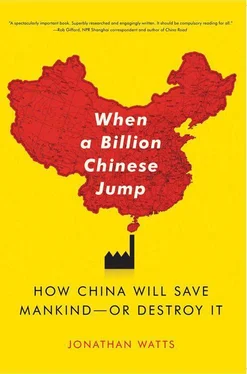The fresh rich stink of cow dung assaulted the nostrils at Professor Jiang’s eco-farming pilot project in Jiangjiazhuang Village. Cornstalks—usually burned or discarded—were bagged up alongside the road for winter fodder. Inside the building, straw matting was spread across bunk beds. Outside, thousands of insects hopped back and forth across a grasshopper breeding pen. “Very nutritious. We’ll try some later,” said the professor.
Jiang described his goal as a new Green Revolution, but it was essentially a return to fundamentals. The son of local farmers, he was raised in this village and had watched with horror what modern farming techniques had done to agriculture. He was trying to find an alternative to fertilizer and, encouragingly, the government was willing to fund him. Cue manure, the ultimate wasted resource. China produces more than three times more excrement than solid waste. 19Most of it flows into rivers and seas, creating a nutrient feast for plankton and algae. Plans are afoot to change this. The government aimed to have fifty million homes using biogas by 2010, some of which would be fueled by animal droppings. 20
For Jiang, better use of agricultural waste was the best way to ease the problems of global warming and food shortages. He was a manure messiah, a stalk savior who wanted to plow postharvest stubble back into the land rather than burning it and releasing more carbon into the air, as I had seen farmers do in Henan.
“More than half of a plant’s photosynthetic carbohydrates are in stalks and leaves. If we use them better, we can ease global warming and make the soil richer,” Jiang said with infectious enthusiasm.
He bounced around his walled farm, expressing a childlike joy in the rich, black, plastic-free soil. “Look how big and red these radishes grow with organic fertilizer,” he beamed, stooping to pull one up. “And these chili peppers. We get a higher yield with our natural methods than the farmers outside do with agrichemicals.” Most vegetables, he admitted, did not grow as fast or as abundantly as they would with the application of nonorganic fertilizer and pesticide, but the difference was small, the quality was higher and, properly licensed, they fetched a higher price in the market because they were safer. 21
Greenies around the world have been saying much the same thing for years. Jiang reminded me of the jolly, idealistic character played by Richard Briers in the 1970s British TV grow-your-own sitcom The Good Life, but instead of an organic garden in a suburban semi, he wanted to introduce eco-farming on a China-wide scale. The aim of the project, he said, was to restore the land to how he remembered it as a child. Essentially, he was trying to re-create a lost paradise with science, government funding, the political backing of the Communist Party, and copious quantities of manure.
There are precedents. The importance of excrement has been extolled in both ancient lore and communist propaganda. Zhuangzi, the most down-to-earth of the Taoist philosophers, held it in high regard. Asked where to find Tao (The Way), he replied, “Dao zai shiniao” (Tao is found in the shit and piss). For Confucians in the thirteenth century, a son’s willingness to taste his father’s excrement was extolled as a sign of great filial piety. In one famous moral fable, a child discovers his father has a health problem because his turds are sweet. 22In the twentieth century, at the height of the Great Leap Forward, the model soldier Lei Feng collected the most idealized pile of manure in China’s history. As the propaganda legend has it, Lei was so moved by the proceedings of the 8th Plenary of the Chinese Communist Party’s Eighth Central Committee that he felt compelled to contribute 500 pounds of manure to the Liaoning People’s Commune. Based on the dung shoveling and numerous other cleaner good deeds by the model soldier, Mao declared in 1963 a “Learn from Lei Feng campaign” for the entire nation. 23More recently, though, dung has become symbolic of the great rural-urban divide. In the countryside, close to the soil, it is a free boon for growth, but in the concrete environment of the city it is a smelly curse that is expensive to dispose of. If biogas takes off, it won’t be in the city.
The changing mores of modern China were apparent as we wandered around the eco-model village. Several homes had been fitted with solar panels on the roofs to heat bathwater, and biogas chambers underground that piped fuel converted from human waste, animal manure, and compost to stoves and lightbulbs. The night soil was collected on an individual rather than a communal basis. Each of the newly fitted homes had its own toilet, a big step up from the shared public facilities of the past. The trend is apparent nationwide: a nation’s social change mapped through its toilet habits. When China was poor and genuinely communist, whole communities squatted side by side in public latrines. Today, however, some are reluctant even to share a seat with their own families. I was astonished to see at one luxury housing compound a five-bedroom home with seven toilets—one per person plus spares for guests and housekeepers. Such developments proclaim more viscerally than any political statement the death of communist values.
Jiang did not care where the night soil came from so long as it could be used efficiently. But villagers were not easily persuaded that it could replace conventional modern power and fertilizer. The new system was imperfect. There was a problem with a bio-powered light, and the gas retained an underlying odor that betrayed its origin. A bigger problem was money. Because the government subsidized biofuel, people accepted it. But there were few takers for the stalk-and-manure alternative to fertilizer that Jiang advocated.
The average Linyi farmer, living on an income of 4,000 yuan per year, could not afford to be a purist. They had seen insecticides, chemical fertilizers, hybridized plants, and growth hormones make the difference between starvation and food security within two generations.
Everyone we met in the village shared the professor’s family name. Jiang Su, a farmer and mother, proudly showed off the strong flame from her biogas cooker and the four grunting pigs that provided most of the fuel for it. Jiang Jun, the dour local Communist Party secretary, sat under a poster of Mao and explained that the village, which got its first telephone only in the late 1980s, soon planned to be one of the first in the country to install biogas streetlamps. Jiang Huixuan, an elderly peanut farmer, used to beg in the streets of Qingdao as a child, but now praised chemical fertilizer and plastic field-sheeting for improving living standards.
Most memorable, though, was Jiang Zhoushi, a baijiu-drinking, chain-smoking 104-year-old who puffed her way through almost an entire packet of cigarettes in our half-hour interview. If there is a set of survival genes, Jiang Zoushi must have had the lot. 24She had lived through several famines, Western colonialism, Japanese occupation, civil war, murderous political campaigns, and eviction by a daughter-in-law during an antirightist movement. In the fight against Japan, her husband had been responsible for shooting local collaborators. During the famine of 1928, she had fought with neighbors to eat the last pieces of bark left on a tree. At that time, she said, she became an unwitting cannibal: “Someone sold us pork soup, but I found a little human finger in it. I knew very well it was from a baby.” 25
No matter which Jiang we met, the refrain was the same: “Life is much better now,” or a variation on the theme. Though the professor was trying to wean locals off chemical fertilizers, people were reluctant to give them up. As far as they were concerned, the agrichemicals had kept hunger at bay for more than three decades.
Читать дальше










